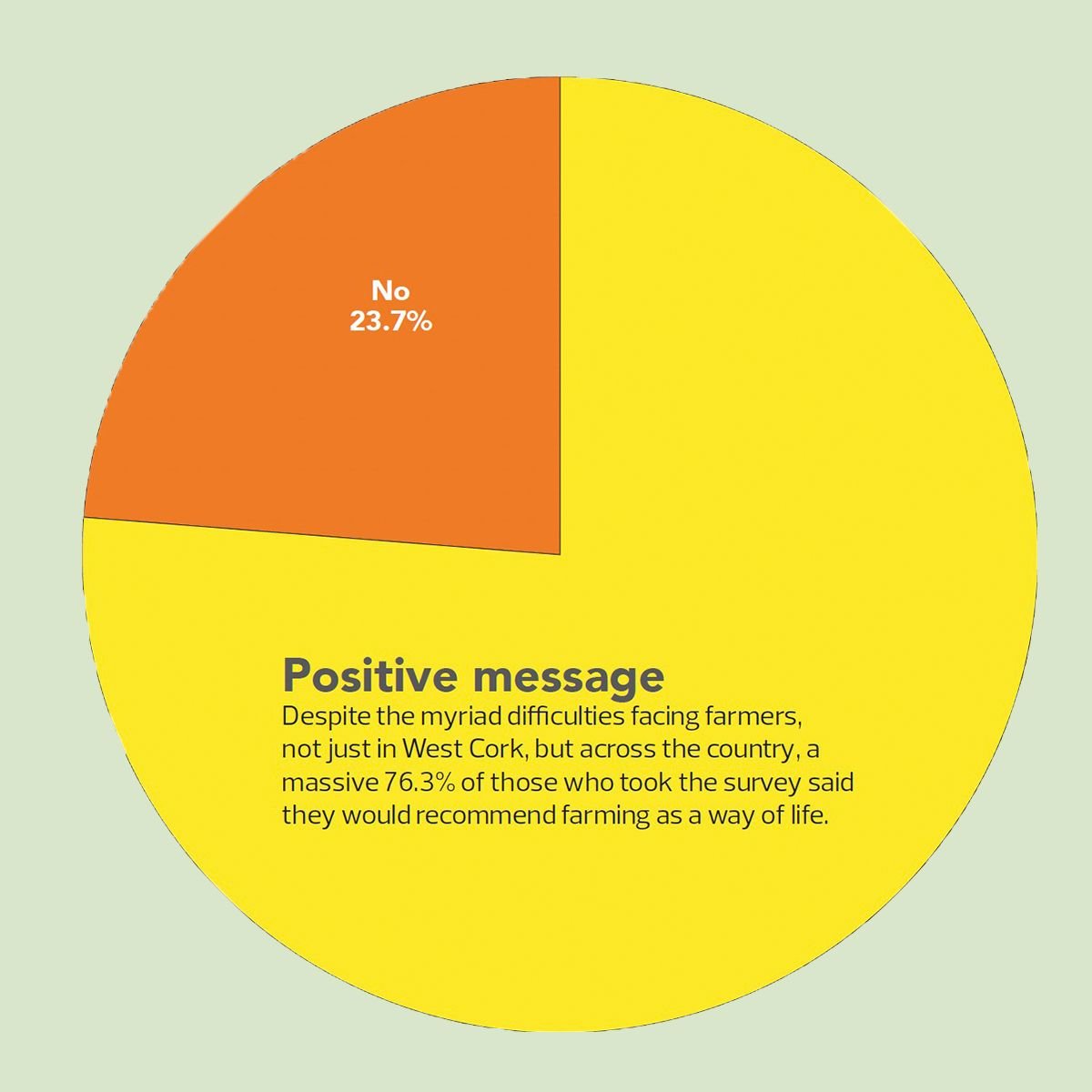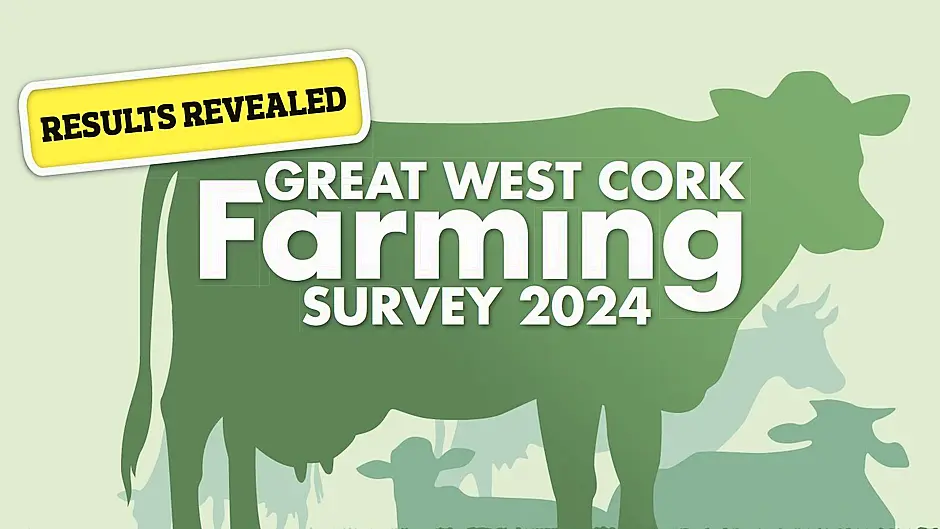The Southern Star’s 2024 survey of West Cork’s farming community offers up a comprehensive and fascinating snapshot of agricultural life in the region
NEARLY three quarters of the farmers who took part in The Southern Star’s 2024 Great West Cork Farming Survey said they were worried about the quality of our water. And 81% said they thought farmers were being unfairly blamed for the reduction in water quality.
The online survey was conducted among a cross-section of West Cork farmers ranging in age from 18 to 74, with most of the respondents being male. The greatest number of respondents were in the 35-44 age group. Nearly one quarter who took part were dairy farmers with 20% beef and 10% dairy and beef.
Dairying heartlands prompted most replies: Clonakilty (17%), Bandon (11%), Skibbereen (16%) and Macroom (11%).
Water quality is currently a crux issue for the agri sector with the EU stating that farmers in certain locations, where water quality has failed to show significant improvement as part of an interim review of the Nitrates Action Programme, will be in receipt of a lowered maximum stocking rate under the nitrates derogation.
There are also fears that the derogation may be lost entirely, an issue which has prompted protest rallies in the region over recent months, with farmers and stakeholders asking for more time to show how water quality is being positively impacted by the actions they’re taking.
Criticisms
Meanwhile, a total of 67% of those who completed the survey said in their opinion criticisms of farmers over greenhouse gases were not justified, and 45% identified climate action as being a ‘very important priority’. A total of 44 % said it was ‘somewhat important’ with 10% replying ‘not so important.’
Concerns
However, despite climate consciousness coming to the fore, it wasn’t what farmers identified as being their biggest single concern for the future.
Just 11.4% said the impact of climate change was their single biggest concern for the future of farming. High input costs was the biggest issue at 38%, low income, 29% and succession, 14%.
Wishes
The survey asked respondents what was top of their current wish list and the opportunity to make a fair living and to be shown respect for the work they do, were recurring topics. So too was an urgent demand for information on the derogation to allow for accurate future planning.
Some 88% of people who took part said that the Government and EU were not doing enough to protect farm incomes, while 88% said they didn’t feel adequately rewarded for the work they did.
Mental health
A total of 46% said they can feel isolated in their work, but 62% saying it didn’t impact their mental health. However, 81% said they felt there weren’t enough supports available for farmers’ mental health issues.
Brexit and lockdown
It’s been four years since Brexit, and 60% of respondents said it had affected their farm enterprise somewhat, with 17% saying it had ‘badly affected’ their work. In the aftermath of Covid 19, 81% said there had been no long-term effects on their work, however of those who said there had been, they listed market instability, price hikes, particularly inflation on all building products as factors.
The future

Positively 74% said they felt they would be involved in the same farming enterprise in 10 year’s time and 76% said they’d recommend it as a way of life.
The full results
Income

A whopping 88% of those who took the West Cork Farming Survey 2024 believe that the government/EU are not doing enough to protect farm incomes. This is a massive change since our survey in 2020 when 62% said not enough was being done. At that time 34% felt the supports were ‘adequate’ but in 2024 that figure has dropped significantly to 10.4%. Feelings that supports are ‘more than adequate’ have dropped from 4% to just 1.7%.
Brexit

While it might seem to have slipped down the list of priorities for a lot of people, Brexit still looms large in West Cork’s agricultural sector, with just 16.1% saying it has had no effect on their enterprise. Almost 24% say that it has had affected them badly/severely.
Water quality

The survey asked if those in the farming community are concerned about the quality of Irish water and an unequivocal 72.6% said ‘yes’. However, there is a very strong feeling amongst survey respondents (81.6%) that farmers are being unfairly blamed for the reduction in water quality. This is very significant because the EU is stating that farmers in areas where water quality hasn’t improved could be subject to a lowered maximum stocking rate under nitrates derogation rules.
Emissions

West Cork farmers, for the most part, feel that criticisms of them with regard to greenhouse gas emissions are not justified, however well over quarter of those who replied feel that these criticisms are at least somewhat justified.
Climate action

Taking steps to mitigate damage to the climate features very highly on the collective agenda with just over 45% of West Cork farmers saying it is ‘very important’ and a further 44.1% saying it is ‘somewhat important’. This is a slight shift since our last survey in 2020 when 40.59% saw it as very important and 51.49% said it was somewhat so.
Covid/lockdown

In June 2020, 62.75% understandably felt that Covid 19 was having somewhat of an effect on their farming enterprise, with 18.6% saying it was affecting them badly and 13.7% saying they were severely affected. Four years on the feeling amongst 81.3% of those who took the survey is that Covid/lockdown has had no long-term effect.
Time

Long days, low returns and no proper time off are contributory factors to the widely-held feeling amongst respondents that farmers are not adequately rewarded for the hours they work. A meagre 11.7% said they do feel adequately rewarded.
Mental health

Just under half (46.5%) of respondents reported feeling isolated in their work (Fig A).

A significant number (37.7%) saying they felt this isolation had an effect on their mental wellbeing (Fig B).

A very robust 81.3% believe that there is a lack of adequate supports for farmers experiencing mental health issues (Fig C).
Representation

When asked if they would serve on the board of a co-op or become an officer in a farm organisation, 53.8% said they would, while 46.2% said they wouldn’t. Lack of time was by far and away the biggest reason for a ‘no’ answer here. Other reasons given included:
• ‘Nothing ever gets done.’
• ‘Extra work on top of the amount of work to be done on the farm already.’
• ‘Too much stress.’
• ‘Hard to get your point across towards people in higher places and end up falling out with peers.’
• ‘There is enough red tape involved in keeping my own farm running never mind get involved in more. I believe that part of the reason that the EU have introduced so much red tape is to keep us from having time to do anything that might possibly challenge them.’
• ‘Co-ops have made a monopoly of the farming industry – trying to tie up farms in unfair ways should be highlighted by media more. It’s all politics, the real normal farmer is not wanted in those positions.’
• ‘Corruption and no matter how much someone tries, people will pick out the bad.’
• ‘I feel the most of the farm organisations only represent the bigger farmers. Sadly that is why I don’t think I’d be interested in being involved. I have served in Macra previously in several positions.’
• ‘No one wants the small farmer on any of these organisations. Always geared to the man with the big numbers.’
Farm safety

Almost 70% of those who took the survey said that safety on the farm was high on their agenda with a surprisingly high figure of 30.4% saying they ‘could be more aware’ and 0.7% said they were ‘not at all aware’.
Looking to the future

Perhaps in line with the earlier figure of 76.3% who said they would recommend farming as a way of life, an encouraging 73.6% also said that they think they will be involved in the same enterprise ten years from now.
Concerns for the future

When asked about their concerns for the future, respondents, perhaps unsurprisingly, ranked high input costs, succession, low income and climate change as their main concerns, but some other of interest included:
• Excessive and unfair regulations being imposed on farmers.
• Uncertainty affecting future investment.
• Quality of farms and produce being affected by greed and over production.
• Lack of education of non-farmers and the extent to which they have an input into how farming is conducted.
When asked what was top of their wishlist at the moment, farmers replied as follows
- That government would acknowledge the role in Irish society of the farming community and maintain the traditional small farming enterprises
- More availability of labour when required
- Proper calculations on emissions
- That everyone in Irish agriculture could make a fair living
- Guarantee on cow numbers for the next 10 years
- To know what the goalposts will be for the future – will the 220/250kg map be scrapped, will derogation be scrapped? Farming families can’t plan for the future currently
- For the EU and Irish government to listen to farmers concerns. Ease up bringing in regulation after regulation without giving previous ones time to bed down. Treat the farmer with respect
- That environmentalists would work with us to develop a balanced sustainable way of farming without the huge fi nancial impact they are currently imposing on farmers with no compensation for our loss of earnings going forward
- More balanced weather
- Government to pullback on derogation rules
- Better milk prices, reduced costs and steady income
- A TB vaccine as some cows are being culled out of farms when it could be prevented
We asked respondents what advice they would give to farmers starting out. Here is a cross-section of the top replies
- Time management is key. Implement processes to make your work day safer, quicker, easier and more cost effective
- Make use of the tax breaks available to young farmers
- Farming is a devotion, don’t do it full time unless you really love it and don’t mind hardship
- Dairy is the only enterprise capable of surviving without subsidies
- Build slowly and keep costs and debt down
- You better love it, as there are far easier ways to make a living
- Get proper education and training and don’t blindly follow tradition
Everybody that completed the Great West Cork Farming Survey was offered the chance to enter a competition for a €100 SuperValu voucher. The lucky winner was Gavin Crowley, Lissarda








